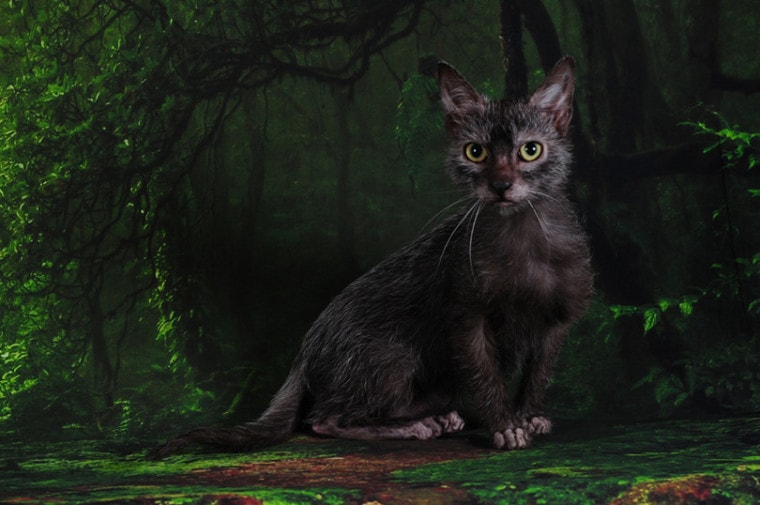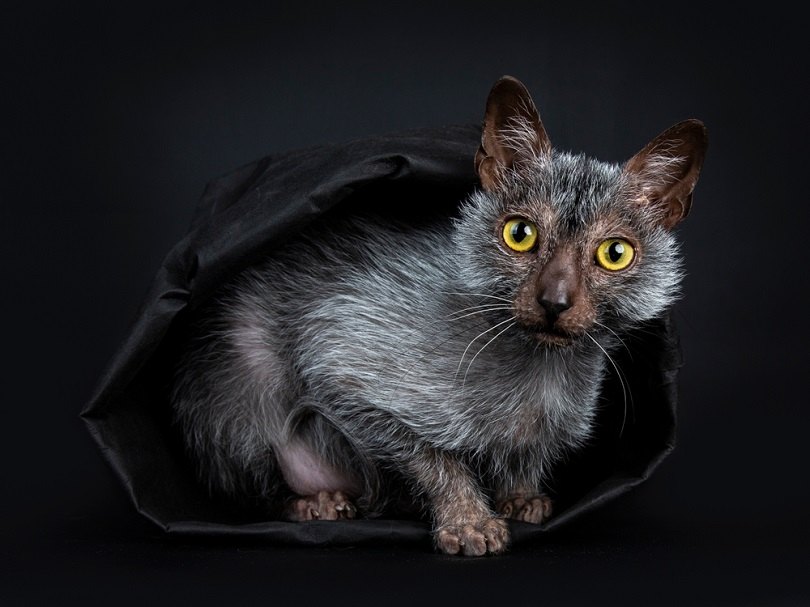
The Lykoi, or Wolf-Cat, is a new breed of cat that has come about from selecting for a coat mutation in domestic shorthaired cats. They are generally healthy animals, but there are some potential health risks that owners should be aware of. In this article, we will discuss five common health concerns for Lykois.
What Is a Lykoi?
The Lykoi is a new breed of cat that has come about from selecting for a coat mutation in domestic shorthaired cats. The name Lykoi comes from the Greek word for “wolf,” and these cats certainly have a wolf-like appearance. They are characterized by their (usually) solid black roan color and minimal coat, which gives them a “scruffy” look. Lykois are partially hairless. This can lead to some health concerns. Though some official breed requirements necessitate a black coat for this cat, others do consider non-black individuals as Lykois and do not consider their coat color as a main point of contention.

Potential Hybrid Vigor
Since Lykois are such a new breed, few breed specific conditions have been reported, and they are generally considered pretty healthy as long as breeders are careful to selectively breed healthy individuals only.
One of the benefits of having a mixed-breed cat is known as “hybrid vigor”.1 This simply means that the offspring of two different breeds are often healthier than either parent. This is due to the fact that mixed-breed cats have a greater genetic diversity, which gives them a better chance of avoiding diseases. Whether Lykois possesses this vigor is still up in the air, as the breed is relatively new.
The 5 Lykoi Health Problems
1. Skin & Hair Issues
One of the most common health problems faced by Lykois is skin allergies and infections. This is due to their minimal coat, which leaves them susceptible to environmental allergens and irritants.
When geneticists were investigating the cause of the scruffy appearance of the wolf-cat, they found an increased risk for lymphocytic folliculitis due to a genetic mutation on the same genes that give the breed its unique coat.2
This particular issue causes an increased inflammation response to histamines around the hair follicles, leading to bald patches and itching.
Lymphocytic mural folliculitis in the Lykoi is often a long-term condition. However, the extent of the condition varies from cat to cat. Therefore, the aim of medication is to control the folliculitis in a way that is ideal for your Lykoi. Medications for this condition include anti-inflammatory drugs and/or immunosuppressive drugs.

2. Hypothermia
Because the Lyoki has sparse hair, it is prone to hypothermia. Hypothermia refers to a body temperature that is below normal. Cat hair is a great heat conductor, as it traps air near the body, allowing it to warm up and provide insulation.
The Lyoki’s lack of a normal coat means they cannot retain heat as effectively as other cats can. Although hypothermia isn’t a disease on its own, its presence can lead to many other problems. Owners of Lyokis can circumvent hypothermia by providing their cats with a warm indoor environment and possibly covering them with a sweater if needed.
3. Sunburn
Because Lyokis have sparse hair & are prone to hypothermia, many owners may try to provide them extra warmth by exposing their cats to the sun. While well-intentioned, this may actually lead to more harm than benefits. The sun’s UV rays are particularly dangerous around areas on a cat’s body with sparse hair, and the Lykoi has many such areas.
Overexposure to the sun can easily result in sunburns on a Lykoi. Exposure to harmful UV rays also increases the risk of cancers, such as squamous cell carcinoma. It is best to keep one’s Lykoi indoors, away from direct sunlight, and use pet-safe sunscreen along with clothing on your cat if he or she prefers to sunbathe.

4. Obesity
Lykois are also at risk of obesity, just like most breeds. Their unique coat means that most owners strive to keep their wolf cat indoors only, which isn’t a problem in itself (in fact, it’s recommended) but can become a problem if owners neglect their cat’s exercise needs. Reduced activity puts cats at higher risk of obesity, especially when coupled with overconsumption of a high-calorie diet. Obesity can lead to a number of health problems, including diabetes, joint problems, and respiratory issues.
It is important to keep your Lykoi at a healthy weight by providing them with a balanced diet and plenty of exercise. You should also take them to the vet for regular checkups to ensure that they are healthy.
5. Urinary Tract Infection (UTI)
The final common health concern for Lykois is UTIs. This is a generally common ailment; most pet cats, regardless of breed, are susceptible to UTIs.
There are many possible reasons and underlying risk factors that may make a cat susceptible to a urinary tract infection. UTIs can cause a variety of signs, including pain, difficulty urinating, and blood in the urine.
If left untreated, UTIs can have extremely detrimental or life-threatening consequences, so it is important to take your Lykoi to the vet at the first sign of urinary problems.

Final Thoughts
Lykois are a relatively new breed of cat that is still being developed. They are generally healthy, but there are some health concerns that are associated with their unique coat and heritage.
It is important to keep your Lykoi at a healthy weight, manage their skin issues diligently, and take them to the vet at the first sign of potential unthriftiness. By taking these steps, you can help your Lykoi live a long and healthy life.
- Related Read: Lykoi Cat Price: How Much Do They Cost?
Featured Image Credit: danilobiancalana, Shutterstock







